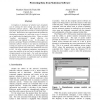Free Online Productivity Tools
i2Speak
i2Symbol
i2OCR
iTex2Img
iWeb2Print
iWeb2Shot
i2Type
iPdf2Split
iPdf2Merge
i2Bopomofo
i2Arabic
i2Style
i2Image
i2PDF
iLatex2Rtf
Sci2ools
103
click to vote
ACSAC
2002
IEEE
2002
IEEE
Protecting Data from Malicious Software
Corruption or disclosure of sensitive user documents can be among the most lasting and costly effects of malicious software attacks. Many malicious programs specifically target files that are likely to contain important user data. Researchers have approached this problem by developing techniques for restricting access to resources on an application-by-application basis. These so-called “sandbox environments,” though effective, are cumbersome and difficult to use. In this paper, we present a prototype Windows NT/2000 tool that addresses malicious software threats to user data by extending the existing set of file-access permissions. Management and configuration options make the tool unobtrusive and easy to use. We have conducted preliminary experiments to assess the usability of the tool and to evaluate the effects of improvements we have made. Our work has produced an intuitive data-centric method of protecting valuable documents that provides an additional layer of defense beyond...
ACSAC 2002 | Malicious Software | Malicious Software Attacks | Many Malicious Programs | Security Privacy |
Related Content
| Added | 14 Jul 2010 |
| Updated | 14 Jul 2010 |
| Type | Conference |
| Year | 2002 |
| Where | ACSAC |
| Authors | Matthew Schmid, Frank Hill, Anup K. Ghosh |
Comments (0)

